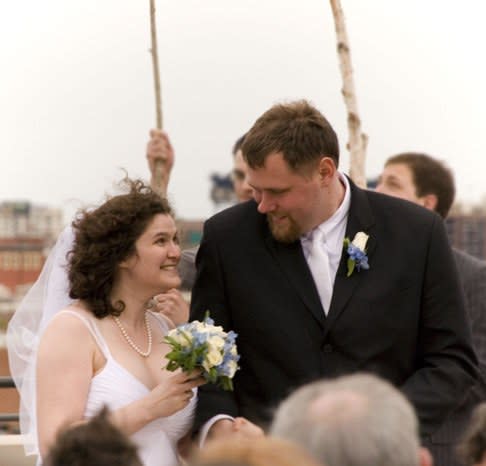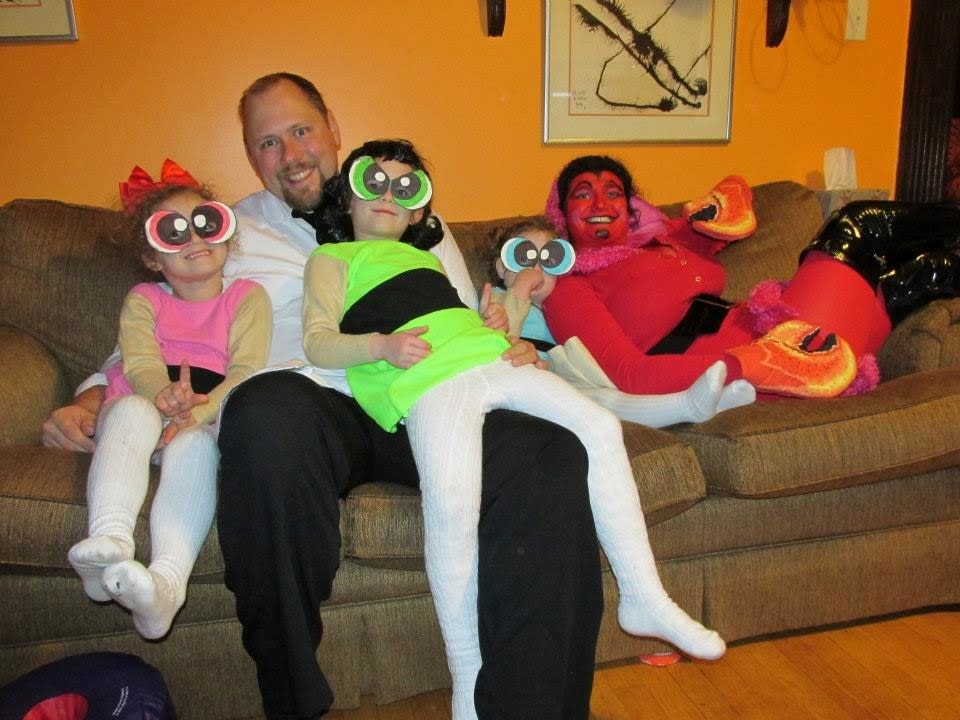First We Got Engaged. Then I Became My Husband’s Caregiver
At 22 years old, I became my fiancé’s caregiver. We had been engaged for 15 hours when he suffered a grand mal seizure; imaging later discovered the tumors in his brain. Doctors estimated he had 16 months left to live.
I became “the wife of the man with brain cancer. I took notes through his doctor’s appointments, logged his symptoms, refilled his prescriptions. Eventually he became one of the 25% of glioblastoma patients that survive over a year. Then, miraculously, part of the 5% who survive five years. For years, he made having brain cancer look easy. He breezed through a clinical trial where doctors dripped arsenic into his veins for hours. He lost his hair to radiation, but the man looks good bald. He remained as brilliant and positive and functional as ever.
That I should take care of him was obvious to me; he was my partner. It was a noble role full of grace and kindness and humor. I owned it. I made him check in with his primary care doctor and go to the dentist. I made sure he went out with his friends once in a while, scheduled us date nights, and took thousands of pictures. I teased him when he complained about household chores, taking out the trash or carrying the groceries up four flights of stairs. “It’s not like it’s brain cancer,” I joked, and he laughed and went about the business of being happily married.

I also became the supermommy. In three years, I became the mother of our three kids. I became a part-time college student with no income. Then I became the graduate who stayed home freelancing, packing lunches, scheduling appointments, and building a career. I began winning awards for my essays and performances. On Halloween I sewed matching costumes for the family: Batman villains, the PowerPuff Girls, the Justice League. I baked colorful birthday cakes and threw thematic backyard parties on birthdays. Each holiday season I made sure to finish shopping for our extended family before the Thanksgiving meals I made from scratch.
I was the woman who could handle anything.
My secret was that it was easy. The brain cancer hardly affected our lives. Our twins slept through the night after two months. My husband was just as much my caregiver as I was his. He provided for our family, took care of my emotional needs, understood my sexual-assault related PTSD better than anyone I’d ever known. There were plenty of worries in my head, but they were mundane, even hypothetical.
Five years ago, shortly before our youngest turned three years old, my husband’s tumors started growing again. Picking up the mantle of active caregiver, I found it heavier than in my memory. The bureaucracy of hospitals and insurance grew denser. Explaining surgery and treatment to family and friends who had long waited for this other shoe to drop became fraught, and while the children had no understanding of the implications of surgical preparations or the vocabulary of illness, they knew frightening changes were on the horizon. I stopped sleeping and spent my days with a phone to each ear, cataloguing requests for pre-surgical epilepsy studies and insurance preauthorizations.
My husband’s recovery was slower and more complex at 31 than at 24. The number of doctors on his team tripled. I had to be trained to help him up and down the stairs, to learn how to properly attach a sci-fi-esque device called Optune to his head, which zapped away tumor cells without chemical aid. He resumed chemotherapy, and I reacquainted myself with tasks I thought I’d mastered seven years before, only now juggling them with the necessities of caring for three young and frightened children.
Under the stress of caregiving, my PTSD symptoms began to bleed into my new reality. At first I didn’t understand why I was so prone to lashing out at my sassy eight-year-old, or why the news of a routine delay on my husband’s commute home filled me with crippling anxiety. That’s the nature of mental illness—its symptoms slide into your everyday thoughts as if they are your own.
Some caregiving tasks lingered until they became routine, while others passed. My husband returned to work again, walked up and down the stairs unaided, drove and shopped for groceries unaccompanied. I refilled the prescriptions, wrote down dates and times and durations of seizures, and took care of my family. Eventually my husband became part of the less than 2% of glioblastoma patients who survive ten years. Our life, for a time, went back to normal.

Then nearly 12 years to the day after his first brain surgery, my husband’s scans showed significant growth in his tumors. His medical team decided the time had come for a third brain surgery.
As hard as it was to return to the active world of cancer caregiving for a second stint, it was astronomically harder for the third. Our children were now old enough to know the words cancer and brain surgery, and to fear them. In between appointments and medication changes and clinical trial authorizations, I put them in therapy. I talked to them through their panic and confusion, I became their rock.
But every surgery is different, and the more often you cut into the same place, the worse the outcome will be. During his third surgery my husband suffered a stroke, leaving him partially paralyzed on his left side. He spent a month in the hospital, then months more in rehab. For the first time my husband found himself unable to bounce back quickly to work and, over the first few months at home, sank into a depressive state typical of right-side stroke survivors. When my kids asked me, “Will Daddy die?” I breathed through panic attacks, my voice a practiced calm. “He’s going to get through this,” I told them.
So I took care of them. All of them. I often found myself shuttling between 15 doctor’s appointments a week. My honorary titles—caregiver, wife of the man with brain cancer, supermom—landed on me with enough heft to crush me. Caregiver stress is a recognized condition, with symptoms nearly identical to those of PTSD. The greatest differences are that caregiver stress is viewed as the purview of middle-age women caring for aging parents, and that it has a defined and tragic end. Having outlived all the statistical data regarding his cancer, there is no expectation that my husband will die any time soon, and with our children rapidly approaching their teen years, the likelihood of ever greater emotional tolls upon me, their primary caregiver, only increases.
Between the caregiver stress, the PTSD, and the fact that my husband has brain cancer, I felt my foundations breaking. I was the primary source of comfort, organization, structure, and emotional support for everyone but myself. Prioritizing myself seemed like the epitome of selfishness—I was there to care for my husband and my children, whose needs were greater than my own. My role was set. My identity was formed and reformed around the needs of those around me and the pathological need to put myself last.
Finally, I sought therapy and began trying to learn to live with the fear I had denied for a decade. When I found my therapist and told her I was suffering renewed symptoms of my PTSD, it had not occurred to me that I was going through anything new. I had completely convinced myself of my husband’s invulnerability to his disease, but my therapist slowly peeled back the bandages I had slapped over these traumas and showed me how raw I was underneath. With her help, I started to see in myself the unhealthy belief structure I had built up around my husband’s survival. I had placed a life-or-death necessity on self-abnegation; I had convinced myself that if I permitted myself even a moment of doubt or fear, he would die. In my mind, my dedication to denial was the magic spell pushing his success.
Of course, none of that was true. While a positive attitude is always helpful, the fact of his illness was not my burden to bear. Through learning that, I began the process of understanding the need to care for myself, and then I began learning to listen to my own emotions, to give myself space to feel what I’m feeling. I’ve learned I’m a better caregiver when I am not trying to solve every problem. Once I was able to express my fears to my husband, he was able for the first time to talk about his fears of recurrence with me. Being able to be vulnerable, to be partners in the stress of our lives, has made our marriage stronger. It has made me a more honest mother, honest about my flaws and my limitations, and it has made me a more compassionate friend.
Despite the still terrifying prospect of sitting quietly and listening to my fears about my husband’s cancer, I stay positive. I believe my husband will be working again full-time in the near future. I believe there are many more years of my burdens easing before they rise again. I believe, even as others we know with glioblastoma continue to follow the statistical shifts toward eternity, that it will get better.
Even when I don’t believe the mantras of calm and hope I repeat to myself, I take my notes, I schedule the next week’s dozen-odd appointments. When I’m afraid of listening to my fears, I put my own emotional health again and again onto the back burner. The life-or-death facts of my husband’s and children’s needs still frequently feel like the most important thing. But when I show up in my therapist’s office without having showered in days, exhausted and anxious and overwhelmed, she sits with me until I have my own care scheduled in beside theirs. She sits with me while I sit with my fear, and she gives me new phrases to repeat. “I matter.” “I am allowed to take a break.” “It’s not okay now, but it will be.”
When it comes to taking care of myself, I am getting better. One small step at a time. I have learned to schedule myself an hour to scrub my tub one day, and two to soak in it the next day with a pitcher of water and a book of poetry. I have learned to make coffee dates with friends for myself. I have learned that it’s okay to put off what is nonessential for my husband or kids in favor of what I truly need. I have learned that there are no life-or-death consequences to scheduling myself a haircut before the kids’ dental exams. On days I spend with my husband at the hospital, getting MRIs or infusions, taking page after page of notes, I make sure we stop for a good dinner on the way home.
Brain cancer has turned out to be a very long road. We’re both better off if we allow ourselves to enjoy the drive.
Lea Grover lives in the Chicago suburbs with her husband, children, and two cats. She’s a member of the RAINN Speakers Bureau, and her 2017 essay about the intersection of sexism and antisemitism is included in the upcoming anthology, Fury: Women’s Lived Experiences in the Trump Era.
Originally Appeared on Glamour

